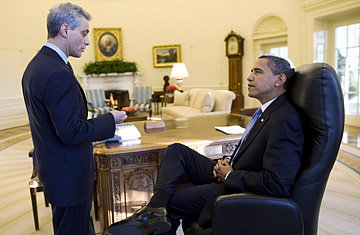
President Barack Obama, right, talks with White House Chief of Staff Rahm Emanuel in the Oval Office
President Barack Obama has promised change for America, but when it comes to environmental regulations, he's still in the grip of yesterday. In his last few months in office, former President George W. Bush's Administration pushed through over 150 "midnight regulations," many of them weakening existing environmental protections. Although Obama is now in charge, most of Bush's new rules are on the books, and changing them will take time and effort from an already burdened White House. "The Obama Administration will be saddled with reversing harmful Bush rules at the same time that Obama wants to enact his own agenda," says John Walke, a senior attorney for the Natural Resources Defense Council (NRDC).
That's no accident. In May 2008, then White House chief of staff Joshua Bolten issued a memo instructing federal agencies to finalize any new regulations by Nov. 1, 2008. At the time, the White House said the memo was meant to head off the rush of last-minute rulemaking that usually jams up the final months of any outgoing Administration. But it also had a tactical purpose: new regulations require 30 to 60 days from their official publication in the Federal Register to take effect. (Regulations that have an "insignificant" economic effect — less than $100 million — need 30 days; bigger rules need 60.) By finalizing midnight regulations at the beginning of November, the Bush Administration ensured that most of the rules would be in effect before Obama took the oath of office on Jan. 20 — in some cases, just before. (See the top 10 green ideas of 2008.)
Despite the Bush Administration's deserved reputation for punctuality, not every new midnight regulation was finalized in time, and the Obama White House acted quickly to slow what it could. In the Administration's first full day in office, White House chief of staff Rahm Emmanuel sent out a memo ordering a halt to all federal regulations not yet finalized until the new team could review them. For the environment, that meant Obama was able to save the gray wolf from being removed from the Endangered Species Act and block a pair of new air-quality rules, including one that would prevent the regulation of greenhouse-gas emissions from oil refineries. (Read "High Hopes for Obama's Green Dream Team.")
But many more rules remain on the books. They include regulations that allow mountaintop-removal mining projects to pollute streambeds with leftover dirt, and a Bush move to begin to permit drilling for oil and gas on the Outer Continental Shelf. Worse, they also include a drastic weakening of the Endangered Species Act, allowing federal agencies to bypass expert advice from federal scientists on whether proposed projects would have an impact on endangered species, essentially cutting the heart out of the act. "The number of regulations where the Bush Administration succeeded far outnumbered the ones where they failed," says Walke.
The Obama Administration isn't completely helpless. As the President, Obama of course can push through regulations of his own, but that can take months, and many of the political appointees who will be manning the responsible federal agencies haven't even been picked yet, never mind confirmed. Environmental groups like the NRDC are already seeking to challenge some Bush regulations in court, and the White House could at least maneuver to suspend — if not yet revoke — the rules while it seeks to overturn them. The Administration could also seek to withhold funding from certain regulations. Last, as part of the Congressional Review Act, which went into force in 1996, the White House can ask Congress to vote down any rule finalized after a certain date, which would include all the midnight regulations. But that law has been used successfully only once since it was enacted, and exercising it would take valuable energy away from Obama's legislative agenda.
With an economy in meltdown, two wars to fight and a need to find his feet quickly, Obama may not have the time to rewrite Bush's rulebook, even if it does hurt the planet. "It's a huge burden on a new presidency that already faces more than its fair share of burdens," says Vickie Patton, a senior attorney with the Environmental Defense Fund. Bush's messes won't be cleaned up easily.
Read "Despite the Economy, Obama Vows to Press Green Agenda."
